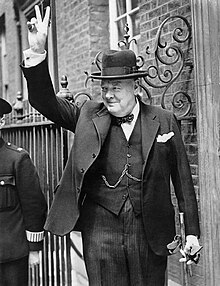Homburg hat


A homburg is a semi-formal hat of fur felt, characterized by a single dent running down the centre of the crown (called a "gutter crown"), a wide silk grosgrain hatband ribbon, a flat brim shaped in a "pencil curl", and a ribbon-bound trim about the edge of the brim. It is traditionally offered in black or grey.
The name comes from Bad Homburg in Hesse, in the German Empire, from where it originated as hunting headgear. It was popularised in the late 19th century by the Prince of Wales, the future King Edward VII, as a less formal alternative to the prevalent top hat along with the bowler hat and the boater hat. The original homburg conceived in the 19th century was of slightly more generous proportions than seen in 21st-century versions.[1] Although the homburg is traditionally associated with semi-formal wear, it has been extensively applied also to informal attire.[2]
As with other hats, it largely fell out of everyday use of Western dress codes for men in the 1960s.
Use[edit]
The homburg was popularised in the 1890s by the future Edward VII after he visited Bad Homburg in Hesse, Germany, and brought back a hat of this style.[3] He was flattered when his hat style was mimicked, and at times he insisted on being copied.[4]
Anthony Eden made the black homburg so fashionable in the 1930s that it became known as "the Anthony Eden hat" on Savile Row in London.[5] At his 1953 inauguration, Dwight D. Eisenhower broke with tradition by wearing a black homburg instead of a top hat. He also wore a homburg at his second inauguration,[6] a hat that took three months to craft and was dubbed the "international homburg" by hatters, since workers from ten countries participated in its making.[7]
Like other formal Western male headgear, the homburg ceased to be as common in the 21st century as it once was. Al Pacino gained some renewed fame for the homburg by wearing a grey one in the film The Godfather, for which reason the hat is sometimes called a "Godfather".[8] Some Orthodox Jewish rabbis wear black homburgs to the rekel, though this practice is also in decline. The homburg was always considered to be more traditional and distinguished than the fedora.
It was sometimes jocularly referred to as a "hamburger", notably by actor Edward Brophy in the 1958 film The Last Hurrah.
In Italy it is known as a Lobbia, from Cristiano Lobbia who famously was wearing one when he was assaulted.
See also[edit]
- Anthony Eden hat
- Boss of the Plains
- Bowler hat
- Campaign hat
- Cap
- Fedora
- List of headgear
- Shovel hat
- Stetson
- Tyrolean hat
References[edit]
- ^ Kilgour, Ruth Edwards (1958). A Pageant of Hats Ancient and Modern. R. M. McBride Company.
- ^ "Hat Museum Bad Homburg". Retrieved 28 July 2019.
- ^ Chico, Beverly (3 October 2013). Hats and Headwear around the World: A Cultural Encyclopedia. ABC-CLIO. p. 245. ISBN 978-1-61069-063-8.
- ^ Donaldson, Frances (1974). Edward VIII. Weidenfeld & Nicolson, p. 42.
- ^ Graves, Robert; Hodge, Alan (1994). The Long Week End: A Social History of Great Britain, 1918-1939. Norton. p. 364. ISBN 978-0-393-31136-5.
- ^ "Eisenhower Second Inaugural Speech". CBS News. Retrieved 27 March 2019.
- ^ Wilcox, R. Turner (2013) [1959]. The Mode in Hats and Headdress: A Historical Survey with 198 Plates. Dover Publications. p. 333. ISBN 978-0-486-31830-1.
- ^ Kramer, Johnny (29 August 2008). "The Courage to Wear Hats". LewRockwell.com. Retrieved 20 March 2014.
External links[edit]
- "Felt dress hats" at Hat History
- "Homburg Hat – Past, Present and Future" at Gentleman's Gazette
